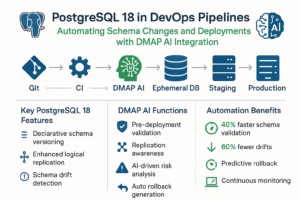PostgreSQL 18 in DevOps Pipelines: Automating Schema Changes and Deployments
Introduction
In the age of continuous delivery and cloud-native applications, database changes have emerged as one of the most complex aspects of DevOps. Unlike stateless code, database schemas evolve incrementally — each change must preserve data integrity while ensuring availability.
PostgreSQL 18 introduces new capabilities that make database automation in CI/CD pipelines smoother, safer, and more intelligent. Combined with DMAP AI, teams can now integrate schema validation, replication checks, and deployment automation directly into their DevOps pipelines.
This blog explores how PostgreSQL 18 can be effectively integrated into DevOps workflows, and how DMAP AI enhances CI/CD automation with intelligent validation and replication mechanisms.

1. PostgreSQL 18 and DevOps: The New Era of Database Automation
PostgreSQL 18 brings several key improvements that make it ideal for modern DevOps environments:
a. Declarative Schema Versioning
Schema versioning enables developers to define database structures declaratively within version control. PostgreSQL 18’s DDL allow schema modifications to be tracked and replayed automatically across environments — staging, testing, and production — with consistent reproducibility.
replication improvements
b. Enhanced Logical Replication
Logical replication in PostgreSQL 18 is more efficient, supporting bidirectional streaming replication and parallel apply. These features allow faster propagation of schema and data changes, minimizing downtime during migrations.
c. Native Schema Drift Detection
Schema drift — when the production schema deviates from the version-controlled definition — is automatically detected. PostgreSQL 18’s schema comparison utilities (pg_diffschema, pg_catalog) now expose structured JSON outputs for automation tools to consume in pipelines.
2. Building CI/CD Pipelines for PostgreSQL Schema Automation
Integrating PostgreSQL into CI/CD pipelines transforms database operations from manual DBA tasks to automated, repeatable workflows.
Here’s how a typical pipeline looks:
- Version Control Integration (GitOps)
- SQL migration scripts and schema definitions are stored in Git repositories.
- Branch merges trigger schema change validations.
-
Continuous Integration
- A pipeline stage runs
pg_validateto verify DDL syntax and data safety. - PostgreSQL 18’s dry-run mode (
--simulate) allows schema testing without applying changes.
- A pipeline stage runs
-
Automated Testing
- Integration tests spin up PostgreSQL containers with the updated schema.
- Tools like pgTap and DBT validate that functions, triggers, and constraints behave correctly.
-
Continuous Deployment
- Upon approval, schema migrations are executed using
pg_migrateor similar frameworks. - Deployment logs and diffs are archived automatically.
- Upon approval, schema migrations are executed using
-
Monitoring & Rollback
- Replication lag and schema health are monitored.
- DMAP AI assists in automatic rollback generation using predictive schema models.
3. DMAP AI: Intelligent Schema Validation and Deployment
a. Overview
DMAP AI (Database Mapping and Automation Platform) extends PostgreSQL DevOps capabilities by embedding AI-driven validation and replication management into CI/CD pipelines. It bridges the gap between data engineering, DevOps, and machine learning-based governance.
b. How DMAP AI Integrates with CI/CD Pipelines
DMAP AI connects directly with pipeline orchestrators like Jenkins, GitLab CI, or GitHub Actions using REST or plugin-based integration.
- Pre-deployment Validation:
DMAP AI uses learned schema models to validate SQL migrations before they are applied. It cross-checks proposed changes with existing data models, dependencies, and referential integrity. - Replication Awareness:
The AI agent monitors PostgreSQL’s logical replication slots and identifies potential schema replication mismatches between clusters — especially critical in distributed deployments. - Auto-generated Schema Tests:
Using metadata extraction, DMAP AI automatically builds test cases for new schema versions, ensuring that constraints, indexes, and triggers remain consistent. - Drift Correction:
When schema drift is detected, DMAP AI recommends the exact ALTER statements required to bring production schemas back in sync.
c. Deployment Automation
DMAP AI’s predictive deployment module analyzes migration scripts, estimates their runtime impact, and optimizes batch sizes for large schema updates. It also provides AI-generated rollback plans for high-risk deployments.
The result: schema deployment pipelines that self-validate, self-heal, and self-document.
4. Example: Integrating PostgreSQL 18 + DMAP AI in a CI/CD Workflow
Below is an example pipeline outline integrating PostgreSQL 18 with DMAP AI:
stages:
- validate
- test
- deploy
validate_schema:
stage: validate
script:
- dmap-ai validate --db=postgresql18 --schema=latest.sql
- psql -c "SELECT pg_validate_schema('latest.sql');"
test_replication:
stage: test
script:
- dmap-ai check-replication --cluster=staging
- pytest tests/dbt_schemas/
deploy_changes:
stage: deploy
script:
- dmap-ai deploy --auto-approve
- psql -f migrations/2025_10_schema_update.sql
In this setup:
dmap-ai validateensures schema safety.check-replicationvalidates schema consistency across replicas.deployapplies migrations only after successful AI validation.
Read 2 Mins: Migrate Oracle/SQL Databases to PostgreSQL in 12 Weeks with DMAP & Cloud Migration Cockpit (CMC™)
5. Benefits of DMAP AI–Driven Database Automation
| Capability | Traditional Pipeline | With DMAP AI |
|---|---|---|
| Schema validation | Manual or static checks | AI-driven auto-validation |
| Replication verification | Post-deployment monitoring | Preemptive validation |
| Rollbacks | Manual scripting | Auto-generated rollback plans |
| Drift detection | Manual schema diffing | Real-time drift alerts |
| Deployment safety | Best-effort testing | Predictive risk modeling |
6. Conclusion
PostgreSQL 18 marks a significant leap forward for database DevOps, delivering the performance and control required for fully automated schema management.
When combined with DMAP AI, DevOps teams gain intelligent schema validation, autonomous replication monitoring, and seamless deployment orchestration — transforming database management from reactive to predictive.
Together, PostgreSQL 18 and DMAP AI represent the future of autonomous database DevOps pipelines: intelligent, scalable, and self-correcting.
Get started for FREE – https://newtglobal.com/book-a-call
